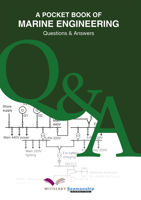Published: April 2023
Introduction to Ship Engine Room Systems outlines the key systems, machinery and equipment found in a ship’s engine room. It explores the basics of their function with overall practical guidance for engine room operation and maintenance, recognising emerging environmental challenges. It covers the following topics:
- The role and function of the steering and propulsion systems
- Power generation
- The heating, ventilation, and air conditioning systems
- The water management system
- Engine room fires and emergency response systems
- Engine room watch procedures and checklists
The book serves as an accessible introductory text for engineering students at HNC, HND, and foundation degree level, marine engineering cadets, and non-engineering marine professionals such as deck officers and cadets who want a general guide to how the engine room functions.
Table of Contents
Part I. Steering and Propulsion Systems.
1. Rudder and Steering Gear.
2. Propeller Design and Function.
3. Introduction to the Main Engine.
4. Key Components of the Main Engine.
5. Main Engine Pre-Start Checks and Monitoring.
6. Slow Steaming and Economic Fuel Consumption.
7. Exhaust Gas System and Scrubbers.
8. Engine Room Lubrication Systems.
9. Essential Engine Room Machinery Maintenance and Troubleshooting.
10. Mechanical Measuring Tools and Gauges.
Part II. Power Generation.
11. Marine Diesel Generators.
12. Marine Electrical Systems.
13. Electrical Distribution Systems and Redundancy.
14. Air Compressor.
Part III. Heating, Ventilation and Air Conditioning.
15. Marine Boiler.
16. Central Cooling System.
17. Refrigeration and Air Conditioning.
Part IV. Water Management Systems.
18. Ballast Water Management.
19. Oily Water Separator.
20. Wastewater Management.
21. Freshwater Generation.
22. Pipes, Tubes, Bends and Valves.
Part V. Engine Room Tanks and Bunkering Operations.
23. Main Fuel, Diesel and Lube Oil Tanks on Ships.
24. Bunkering Operations.
Part VI. Engine Room Fires and Emergency Response.
25. General Emergency Drills, Alarms and Emergency Systems.
26. Engine Room Explosions and Fires.
27. Engine Room Drills, Firefighting Procedures and Apparatus.
28. Engine Room Flooding.
Part VII. Engine Room Watch Procedures.
29. Engine Room Watch Procedures.
30. Engine Room Logbook Entries and Checklists.
Appendix. Recommended Reading for Marine Engineers.
































